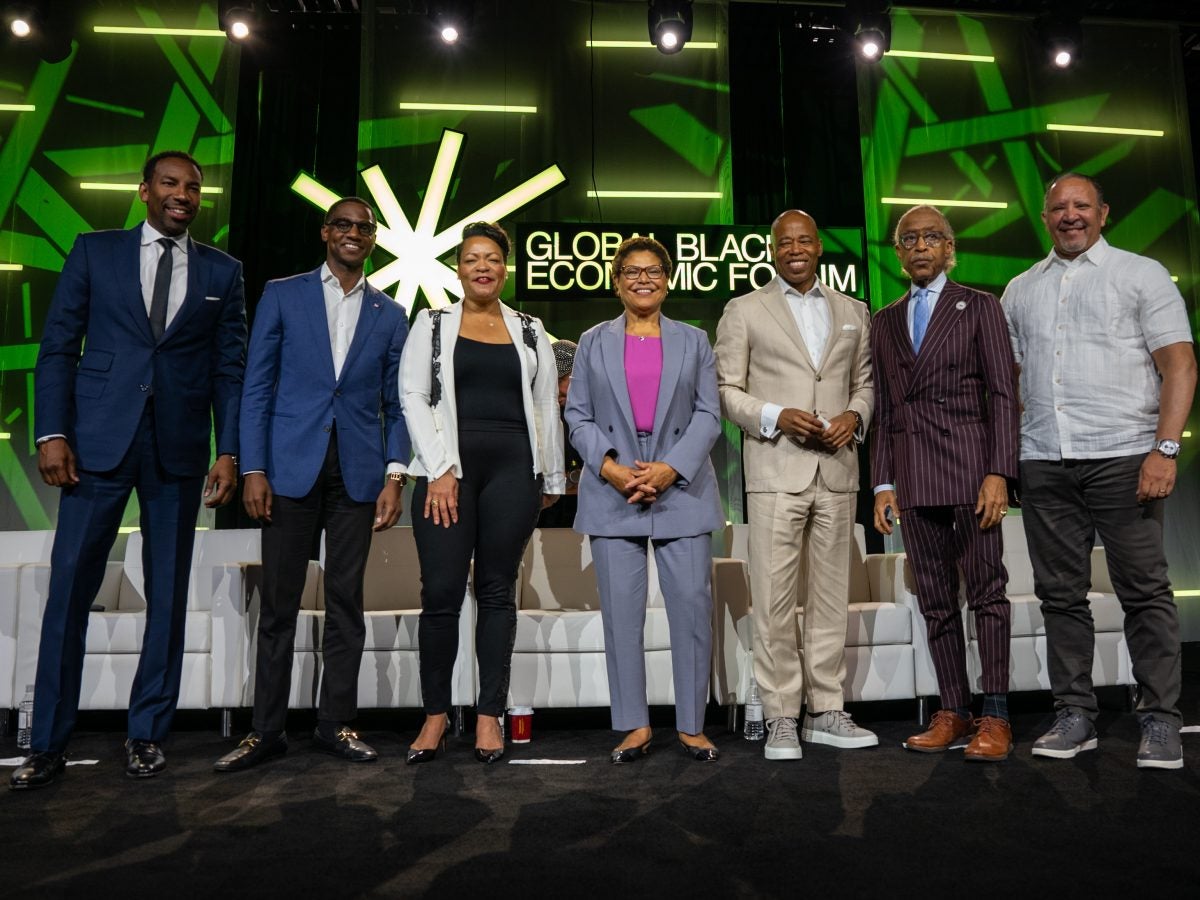
NEW ORLEANS – Despite representing disparate parts of the country, Black mayors of major U.S. cities raised a common concern: state government, which is largely GOP-led, is stifling the progress of their cities.
Earlier this month, the ESSENCE Festival of Culture’s Global Black Economic Forum HQ stage hosted mayors LaToya Cantrell (New Orleans), Eric Adams (New York City), Karen Bass (Los Angeles), Andre Dickens (Atlanta), and Justin Bibb (Cleveland), for “The Mayor’s Roundtable.”
Marc Morial, President of the National Urban League and former Mayor of New Orleans joined Al Sharpton, President of the National Action Network, in providing opening and closing remarks to punctuate the panel.
In the hour-long conversation, moderator Mayor Cantrell asked her colleagues about everything from what excited them in their administrations to what kept them up at night.
They also shared some common challenges.
“In many of our respective cities– like New Orleans, we’re a Democratic city in a Republican state– we have to fight for direct allocation,” Cantrell began one of her questions, referencing how funds are distributed in the state. “Because when the dollars go to the state, they don’t somehow get to the city of New Orleans. And it’s not by accident.”
“What Mayor Cantrell is talking about is that cities are just creatures of the state. So if the state has a law that supersedes the city’s law, then your law is void,” Mayor Dickens shared. “So I want to do rent control in the City of Atlanta. You can’t do it because the state prohibits rent control. I want to set a higher minimum wage and the City of Atlanta can’t do it because the state prohibits it.”
“This is why we have to be very, very, very dedicated to our state elections and the elections of our state legislature because they have a tremendous amount of control,” Dickens stressed.
Mayor Bibb shared similar sentiments. “You have to vote for good governors in our states, because they are quietly trying to attack Black and brown cities across this country. And we are handicapped by racist lawmakers in our state houses who are scared of what powerful Black political leadership looks like in our country.”
When asked what kept the mayors up at night, Mayor Bass stated that “know[ing] that tonight three to five folks will die in Los Angeles in tents.”
To combat the notorious homelessness crisis in the California city, Bass noted that her administration is “moving people off the streets, out of tents, into motels.”
Bass also clarified a common misunderstanding about those who are unhoused, noting that a “myth about homelessness is that people want to be in the tents.” She continued: “the fastest growing population of homeless in Los Angeles are senior citizens, senior citizens who worked in the service economy, maybe they worked in retail, they didn’t have a pension, they didn’t have a 401k, they get up in age, and they can’t afford the rent anymore. They’re priced out of the market.”
In closing remarks, Morial, a former mayor of New Orleans, added historical context to the challenges Black mayors are facing. “In the 1970s [and] the 1980s when the historic generation of first Black mayors took power, American cities were attacked,” he began.
“The money was stripped away in this city. In Atlanta, there were efforts to take over the airport, take over the zoo. There was a pernicious effort to undermine our electoral success by using legislatures and federal policies and rhetoric from newspapers, and pencil pushers and so- called good government groups to undermine power,” Morial added.
The former mayor and National Urban League President also issued a warning:
“What we’re going to witness in the next 18 months is an orchestrated effort to point the finger at American cities and their challenges and their problems to try to undermine the credibility of Black leadership and of American cities. The first thing for us to be is to be aware, and I’ll say, yes, woke. Because if you’re not woke, you’re asleep. And we can’t be asleep.”





